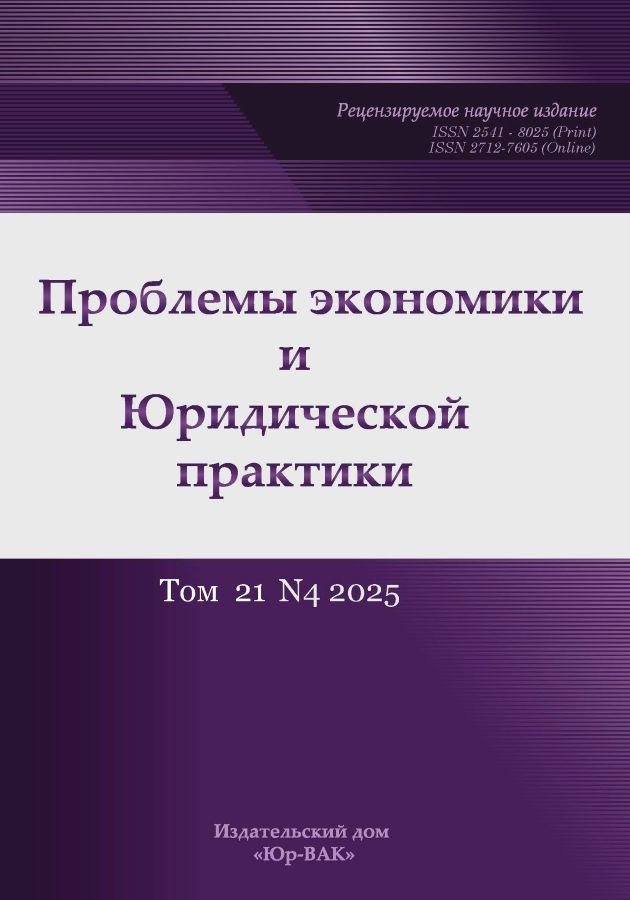Foreign practice of protecting national interests in foreign trade policy
- 作者: Grebenkina S.A.1
-
隶属关系:
- Financial University under the Government of the Russian Federation
- 期: 卷 21, 编号 4 (2025)
- 页面: 154-158
- 栏目: Regional and Sectoral Economics
- URL: https://journals.eco-vector.com/2541-8025/article/view/691592
- DOI: https://doi.org/10.33693/2541-8025-2025-21-4-154-158
- EDN: https://elibrary.ru/DLRVWE
- ID: 691592
如何引用文章
详细
The article reveals foreign experience in mitigating foreign economic threats to protect national interests of the state using the example of the United States. In the context of increasing challenges in the global arena, it is highly relevant to consider the practices of other states in order to find effective tools to ensure sustainable functioning of the state economy. In the work, the author notes the main external threats to the national interests of the United States and the tools for mitigating them. Thus, every year in America's foreign trade turnover there is a stable trade deficit, generating dependence on foreign suppliers, exerting a negative impact on the production base, and building up advanced production capacities. Increased dependence on foreign manufacturers of goods makes the supply chain of American goods vulnerable to geopolitical disruptions. The work presents the practice of tariff and non-tariff restrictions to protect national interests using the example of such states as the EU, Argentina, Brazil, India, Indonesia and others. The article considers the foundations of the current American policy to combat external challenges and threats, its importance in achieving competitive advantages of the state. The foundations of US tariff protectionism are revealed. Its main advantages and disadvantages are noted.
全文:
作者简介
Svetlana Grebenkina
Financial University under the Government of the Russian Federation
编辑信件的主要联系方式.
Email: s.greb@list.ru
SPIN 代码: 2488-9860
Cand. Sci. (Econ.), Associate Professor, Leading Researcher, Institute of Economic Policy and Economic Security Problems, Faculty of Economics and Business
俄罗斯联邦, Moscow参考
- Arapova E.Ya. The US—China trade war: Economic and legal effects. Comparative Politics. 2022. No. 1–2, Pp. 98–115. (In Rus.).
- Gorodetsky A.E. Technological transition: Economic crisis, sanctions, and a new technological agenda. EVR. 2022. No. 3 (73). Pp. 71–88. (In Rus.).
- Ivanov O.B. Global challenges, threats, and risks of the modern world. ETA. 2023. No. 4. Pp. 7–82. (In Rus.).
- Knobel A.Yu., Ponomareva O.V., Sedalishchev V.V. The US—China trade war and Its consequences for the global economy. Economic Policy. 2024. No. 19 (5). Pp. 30–53. (In Rus.).
- Poyarkov S.Yu. National security in the context of the transformation of modern constitutionalism: from declarativity to institutionalization. National Security. 2025. No. 3. Pp. 28–46. (In Rus.).
- Sizov G.A. The problem of protecting the «foreign interests of the state» in China's foreign policy strategy: conceptual, legal and expert dimensions. East Asia: Facts and Analytics. No. 4. 2024. Pp. 63–79. (In Rus.).
- Timofeev I.N., Rozhdestvenskaya O.S., Sokolova T.S., Chupriyanova P.I. Sanctions policy: concept, institutions, practice: teaching materials №. 11. 2024 / I.N. Timofeev, O.S. Rozhdestvenskaya, T.S. Sokolova, P.I. Chupriyanova; edited by I.N. Timofeeva, S.M. Gavrilova, P.I. Chupriyanova, D.O. Rastegaev; Russian International Affairs Council (RIAC). M.: NP RIAC, 2024. 96 p.
- Yunyushkina A.S., Shapovalova K.A., Katkova E.Yu. The US trade war with China as an attempt to regain global leadership. International Relations. 2021. No. 2. Pp. 55–68. (In Rus.).
- Yang Zh. The US—China Trade War and Global Value Chains. Washington, DC: World Bank, 2023.
- Fajgelbaum P., Khandelwal A. The Economic Impacts of the US—China Trade War. NBER. Working Paper №. w29315. 2021.
补充文件








